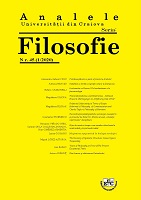INEFABILUL CA LIMITĂ A COGNIȚIEI UMANE LA DAMASCIUS
THE INEFFABLE AS A LIMIT OF HUMAN COGNITION IN DAMASCIUS
Author(s): Adriana NeacşuSubject(s): Epistemology, Ancient Philosphy, Philosophy of Mind
Published by: Editura Universitaria Craiova
Keywords: Ineffable; Principle; knowledge; Absolute; Damascius;
Summary/Abstract: The ancient Greek philosophers have long thought that human mind can successfully penetrate all reality, the whole problem being that of the best way of knowing. Gradually, they realized that our cognitive activity, however, has many limitations, which they have always tried to overcome. The privileged instrument that philosophers used to get the truth about world was the principle of all things. But this, more than any other thing, has proved very slightly permeable to our mind trials to know it. In his book: Difficulties and Solutions of First Principles, Damascius, the last scholar of the Neo-Platonist School in Athens, presents a series of aporias which the human mind enters into when it strives to acquire available knowledge about the principle of all things. Influenced by mystical experience of Oriental thinking, Damascius calls the first and highest of all things principles "The Ineffable". Our mind ascends towards it increasingly difficult, going from aporia to aporia, stopping in front of it as if it were an insurmountable limit of human knowledge. Carried out at the end of all ancient Greek philosophy and being the voice of some theoretical concerns, which certainly ranked an important place within philosophical schools, Damascius’ meditation on Ineffable can be seen as the answer of philosophical antiquity to the questions if and how human mind can know the Absolute.
Journal: ANALELE UNIVERSITĂȚII DIN CRAIOVA. SERIA FILOSOFIE
- Issue Year: 1/2020
- Issue No: 45
- Page Range: 22-42
- Page Count: 21
- Language: Romanian

